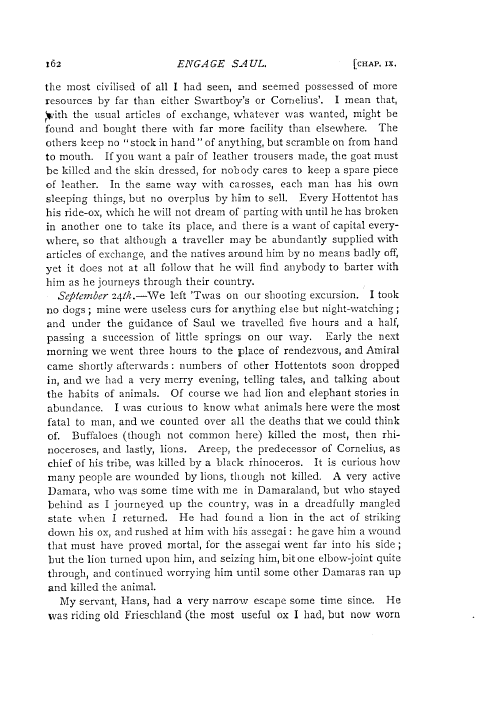162 ENGAGE SAUL. [CHAP. IX,
the most civilised of all I had seen, and seemed possessed of more resources by far than either Swartboy's or Cornelius'. I mean that, With the usual articles of exchange, whatever was wanted, might be found and bought there with far more facility than elsewhere. The others keep no " stock in hand " of anything, but scramble on from hand to mouth. If you want a pair of leather trousers made, the goat must be killed and the skin dressed, for nobody cares to keep a spare piece of leather. In the same way with caresses, each man has his own sleeping things, but no overplus by him to sell. Every Hottentot has his ride-ox, which lie will not dream of parting with until he has broken in another one to take its place, and there is a want of capital everywhere, so that although a traveller may be abundantly supplied with articles of exchange, and the natives around him by no means badly off, yet it does not at all follow that he will find anybody to barter with him as he journeys through their country.
September 24111-We left 'Twas on our shooting excursion. I took
no dogs ; mine were useless curs for anything else but night-watching ; and under the guidance of Saul we travelled five hours and a half, passing a succession of little springs on our way. Early the next morning we went three hours to the place of rendezvous, and Amiral came shortly afterwards : numbers of other Hottentots soon dropped in, and we had a very merry evening, telling tales, and talking about the habits of animals. Of course we had lion and elephant stories in abundance. I was curious to know what animals here were the most fatal to man, and we counted over all the deaths that we could think of. Buffaloes (though not common here) killed the most, then rhinoceroses, and lastly, lions. Areep, the predecessor of Cornelius, as chief of his tribe, was killed by a black rhinoceros. It is curious how many people are wounded by lions, though not killed. A very active Damara, who was some time with me in Damaraland, but who stayed behind as I journeyed up the country, was in a dreadfully mangled state when I returned. He had found a lion in the act of striking down his ox, and rushed at him with his assegai : he gave him a wound that must have proved mortal, for the assegai went far into his side ; but the lion turned upon him, and seizing him, bit one elbow-joint quite through, and continued worrying him until some other Damaras ran up and killed the animal.
My servant, Hans, had a very narrow escape some time since. He was riding old Frieschland (the most useful ox I had, but now worn

